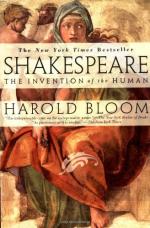
|
| Name: _________________________ | Period: ___________________ |
This quiz consists of 5 multiple choice and 5 short answer questions through Chaps. 21-23.
Multiple Choice Questions
1. Who is the center of the subplot in "Twelfth Night"?
(a) Orsini.
(b) Olivia.
(c) Malvolio.
(d) Cesario.
2. How does Bloom characterize "Richard III"?
(a) Absurd.
(b) A spectacle.
(c) Successful.
(d) Improbable.
3. What does Bloom reiterate about Christopher Marlowe?
(a) That he drank heavily while writing.
(b) That he was older than Shakespeare.
(c) That he was a youngest son.
(d) That he was murdered by English government agents.
4. What is the sentence for Claudio's unlawful fornication?
(a) Exile.
(b) Imprisonment.
(c) A fine.
(d) Death.
5. What does critic Marc Shell say Shakespeare is criticizing in Angelo's strict enforcement of law in 'Measure for Measure'?
(a) The royal family's peccadilloes.
(b) The Puritans' ineffective morality campaigns.
(c) The notion of law and order at all.
(d) Hypocrisy in the government's morality campaigns.
Short Answer Questions
1. What does Bloom say in response to Hamlet's claim that he was a prisoner in Denmark?
2. Who does Julia look for, while she is disguised?
3. What is Richard III's most famous line?
4. For whom is Shylock a predecessor, in Bloom's interpretation?
5. Who is Queen Mab, according to Bloom?
|
This section contains 255 words (approx. 1 page at 300 words per page) |

|




